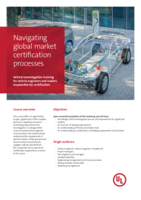
UL Automotive Homologation Training Sell Sheet
Navigate complex global market certification processes with UL Solutions.

This course offers an opportunity to gain a global view of the complex processes, regulatory resources and testing requirements for homologation.
UL Solutions designed this course for project-level engineers and executives who need to better understand the requirements of specific markets. While geared more toward vehicle manufacturers, suppliers will also benefit from the component and system-level certification requirements covered in the course.
Upon successful completion of this workshop, you will have gained:
From materials testing to supply chain management, new energy options to security and interoperability solutions, leverage our expertise and insights to navigate the global regulatory landscape and bring your products to market.
UL Solutions’ global network of technical experts and state-of-the-art facilities helps manufacturers gain the knowledge they need to achieve their compliance credentials that are essential to compete in a more complex global supply chain.
Knowledge you can trust—Our experienced staff will support you from the initial design stage of product development through testing and production. Our experts can assist you in understanding the certification requirements for your specific markets.
Speed and efficiency—Our cost-effective systems and state-of-the-art facilities cut through the red tape and help accelerate your time to market.
Single-source provider—UL Solutions meets all your compliance needs and, by bundling safety, performance and interoperability services, helps save you valuable time and money.
Global reach and access—Our global network of expert engineers helps you understand the various national and global requirements for your specific market application.

UL Automotive Homologation Training Sell Sheet